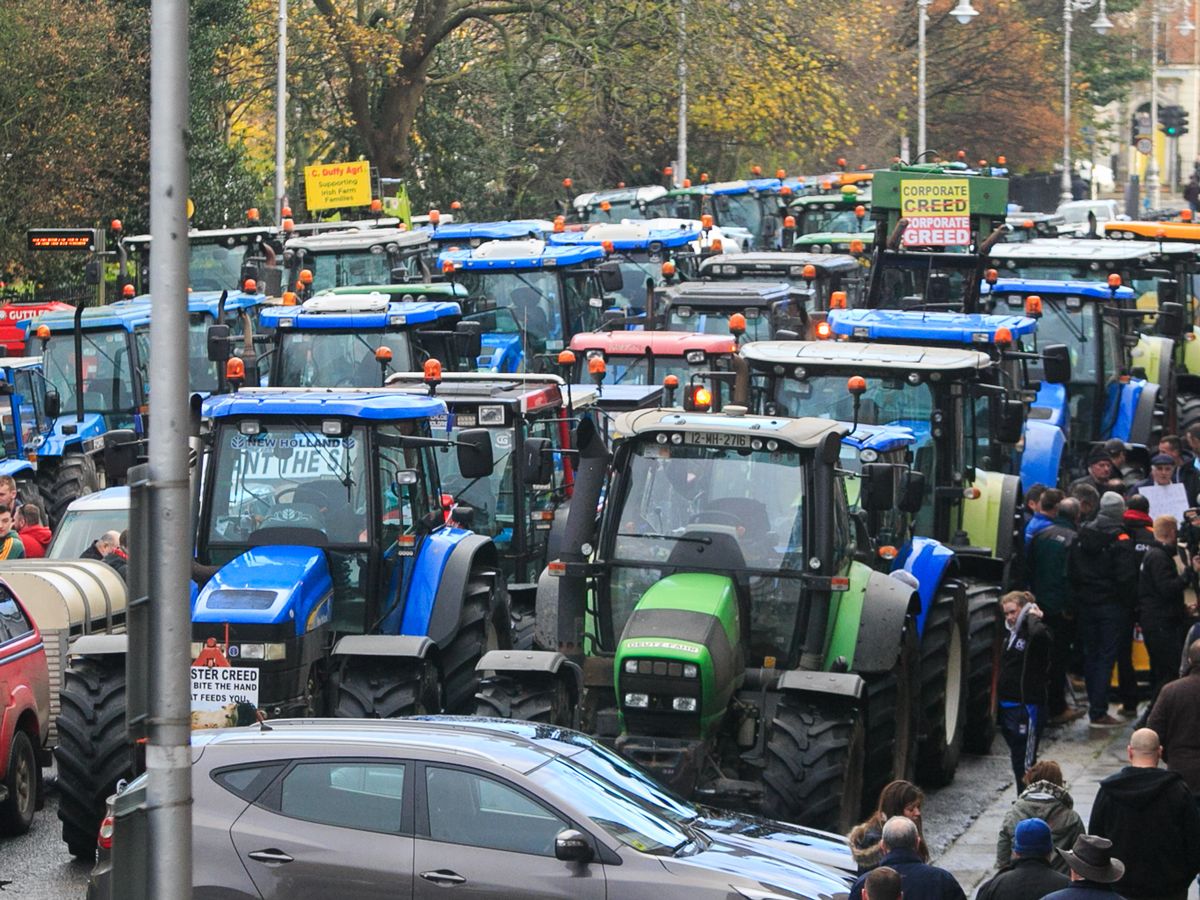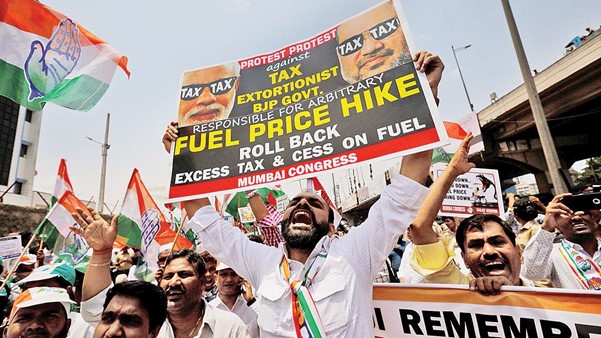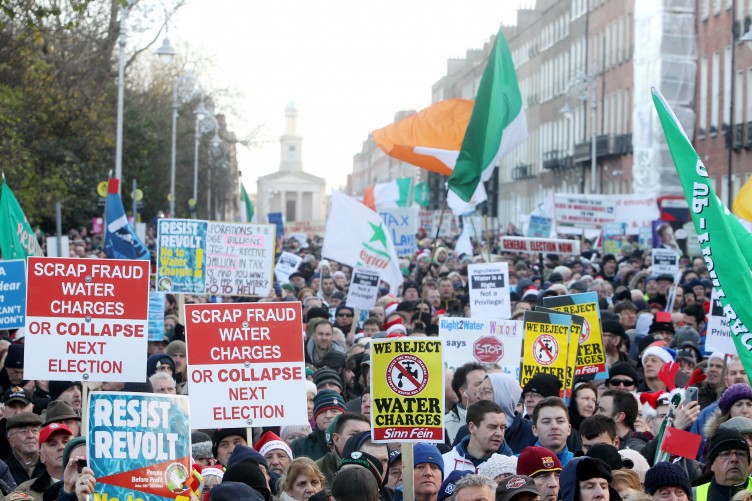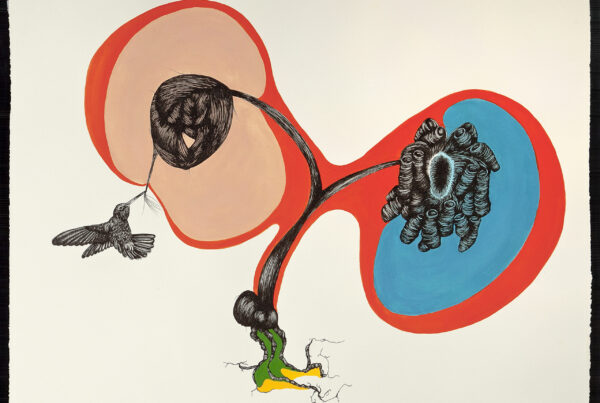By Patrick Bresnihan
The fourth essay of the series “Reimagining, remembering, and reclaiming water: from extractivism to commoning”, co-organized with the FLOWs blog, looks at the most visible social mobilisations in Ireland in recent years –the anti-water charges movement in 2014-15 and the beef farmer protests in the winter of 2019. While not commonly seen as ‘environmental movements’, understanding some of their common roots may help us to re-imagine, remember and reclaim a form of environmental politics that is from below, popular, and has justice at its core.
In Ireland, where workers and rural communities have often been seen as ‘anti-environmental’ (and even identify as such because elite environmentalism is anti-worker and anti-rural), there is a real need to develop connections between a diverse set of grievances that traverse the rural and urban, the green and red. These grievances are often localised and reactionary, and while the target is often political and economic elites, their politics are not easily located on the left/right political spectrum. Though distinct in many ways, two recent mobilisations in Ireland, one largely urban, the other rural, offer some points of connection that are worth making.
In 2014, under pressure from the Troika, the Irish government sought to introduce domestic water charges and other reforms of the public water sector. The government presented these reforms as an environmental measure to incentivise individual and household water conservation and as a means of raising much-needed revenue for upgrading a failing water system. But the proposed water charges, set to rise after the initial ‘soft’ period of four years elapsed, were a significant burden on large sections of the population already suffering from four years of austerity measures. During 2014, a popular movement spread from an initial phase of largely working class, community-based blockades against the installation of water meters, to mass, nation-wide demonstrations, to widespread refusal to pay once charges were introduced. The opposition was most intense and vocal in urban areas, articulated as part of a broader anti-austerity campaign brought together under the Right2Water movement – a coalition of trade unions, left political parties, community and citizen groups. By 2016, this popular movement had successfully forced the Government to withdraw its policy of charging for household water consumption.
In November 2019, hundreds of beef farmers from across Ireland brought their tractors to Dublin city centre and picketed outside the parliament for weeks. This protest grew out of earlier, smaller blockades that had taken place outside specific meat processing plants (a sector that has come under renewed scrutiny during Covid because of poor working conditions). These local and then national blockades stemmed from farmers’ anger at the prices they were getting from the processors; beef farmers claimed they were not making enough money to cover their costs, while processors and larger retailers profited. Exacerbating these concerns was the imminent Mercosur deal – a trade deal between the EU and several South American countries. The prospect of lower-priced beef entering EU markets from South America would be the final straw and appeared to contradict the environmental rhetoric and regulations imposed by Europe and the Irish state on Irish farmers.

At the end of 2019, hundreds of Irish beef farmers blockaded Dublin city centre demanding better prices for their produce, amongst other grievances. These protests were replicated in other European countries. Source: Irishmirror.ie
What do protesting beef farmers have to do with water politics? Beef farming, along with dairy, is the principal source of agricultural pollution in Ireland, which in turn is the greatest source of declining water quality. The industrial-scale of intensive dairy (and beef) farming that has developed since the 1980s is also responsible for the majority of Ireland’s greenhouse gas emissions and the decline in biodiversity – through the monoculture of grass and the effects of eutrophication on water bodies. The (toxic) green fields of Ireland are part of an elaborate chemical regime that is global in scale – not just through the inputs of pesticides and fertilisers and high levels of water consumption, but through the processing and marketing of milk-based products to the food industry. The pressures that farmers are under to reduce costs and increase production, with subsequent negative implications on the environment, are the result of highly uneven, global agri-food commodity chains.
As elsewhere, the dominant response to the well-documented environmental problems associated with Irish beef and dairy farming has been to control the pollution, rather than prevent it. By placing the focus on the pollutant – nitrogen, MCPA, phosphorus – the policy and economic drivers that produce the pollution are backgrounded. The result has been ever more elaborate forms of localised, largely voluntarist solutions (including payments for environmental services), poorly enforced regulations, and the promise of technological solutions (e.g. biogas to convert manure from waste to energy). In other words, responsibility for water pollution is placed onto individual farmers. The problem with this individualised response to a systemic problem is that farmers are not all equal. A recently published report from the Think-Tank for Action on Social Change (TASC), highlights that the agricultural sector has the most severe inequality in income distribution of any sector in Ireland. This level of inequality raises serious questions as to who in the sector will benefit from the Government’s Food Wise 2025 plan, which projects a €19 billion per annum increase in the agri-food industry by 2025, and who will carry the burden of responsibility for the environmental contradictions that arise from this policy.
The anti-water charges movement and the beef farmer protests are distinct in many ways – urban/rural, water access/water pollution, infrastructural/land-based – but they also share some important characteristics. First, they are direct and indirect responses to state imposed eco-austerity by the communities most affected by these policies. Eco-austerity is a term used to describe the extension of neoliberal policies that place the greatest burden of responsibility on the poorest and most vulnerable for environmental problems. Presented as environmentally progressive actions, such measures are more about reinforcing the status quo, while allowing the state to appear as though it is taking its environmental commitments seriously. In Ireland, household water charges are one form of this, as are voluntarist pollution mitigation measures aimed at individual farmers. Unsurprisingly, the anti-water charges movement was most intense and visible in urban, working class areas – where the burden of another austerity tax would be felt most strongly. Similarly, the beef farmers who protested the meat processing plants, calling on the Government to intervene, were those who could not sustain a farming livelihood, not the wealthier farmers and processors. In both cases, those protesting expressed a vivid sense of injustice that may have been in response to a particular issue, but was fuelled by much longer experience.

From Ecuador to India, people across the world have been protesting eco-austerity measures such as gasoline, energy, and water taxes that disproportionately impact the poorest. Source: Zeebiz.com
From Ecuador to India, people across the world have been protesting eco-austerity measures such as gasoline, energy, and water taxes that disproportionately impact the poorest.
Second, and related to this point, is that both anti-water charges protestors and beef farmers are often presented in mainstream media and political discourse as being opposed to the ‘environment’. Environmental NGOs, the Green party, and an array of academics and ‘expert’ media pundits supported the introduction of water charges as a ‘necessary’ environmental measure. Similarly, farmers are routinely blamed for many of Ireland’s environmental problems, which, while partially true, obscures the fact that the sector is highly unequal and requires fundamental re-structuring. This is complicated by the role of powerful lobby groups such as the Irish Farming Association (IFA). The IFA, supported by a compliant media, are only too happy to reinforce a neat distinction between hard-pressed farmers and urban environmentalists. Yet in fact, many, smaller farmers are not represented by the IFA, including the protesting beef farmers who formed their own, grassroots campaign group as a direct response to this.
Third, both the anti-water charges and farmer protests were responding to changes in specific circumstances that were collectively seen as unjust or wrong (i.e. a new tax, reduced prices below cost of production). Their demands were defensive: keep things as they are, or as they are imagined to be. This is not because they are proponents of the status quo in general, but because they are protecting basic social and economic conditions against further erosion. This reactionary politics, stemming from indignation, is what the mainstream media in Ireland labels ‘populist’. This term has been circulating widely since at least the anti-austerity movements in 2010, generally used to describe politically ambivalent social movements, more often ascribed to the political right and despised by liberal elites.
In a recent article discussing the protests by Dutch farmers in 2019 (similar to those in Ireland), Jan van der Ploeg largely dismisses them as part of a wider phenomenon of right-wing ‘regressive populism’ that is particularly evident in rural constituencies. He argues that farmers are keen to protect what they have even though this is a system that is unsustainable, relying on the release of tonnes of organic and inorganic chemicals into water, land and atmosphere every day. The same could also be said about the anti-water charges protests; well-meaning environmentalists point to failing water infrastructures and water shortages as the reason to change how people value and use water. But the objections made by farmers and anti-water charges protestors are not against more sustainable systems of agriculture or water provision, they are against policies that place the burden of responsibility for this transition on them. As Peter Linebaugh shows in his recent book, Red Round Globe Hot Burning, such defensive responses to changes in material conditions, such as the enclosure of commons and the raising of taxes, have historically been the “minute facts” around which universal questions of rights, customs, and justice arise.
In a series of blog posts on this website, Luigi Pellizzoni argues against a quick dismissal of recent environmental movements that have been described as ‘populist’ (he focuses on Fridays for Future, Extinction Rebellion and Gilets Jaunes). While the Irish anti-water charges protests were more specifically part of a wave of anti-austerity struggles, they overlap with more recent campaigns against green taxes that have been implemented and rejected across the world. Recognising the risk of such grievances being channelled into right wing politics, Pellizzoni also identifies the potentially greater risk of depoliticization through state reform. As the hopeful claims of a Green New Deal proliferate, it is important that these objections to business as usual are not just channelled into a re-modelled green economy.
In January of this year, Ireland had an unexpected election result that was generally interpreted as a rejection of the neoliberal policies of recent years, policies that have resulted in a housing and health care crisis, and a deepening of social inequalities. After a six-month hiatus, in part due to the Covid emergency, the Green Party finally formed a centre-right Government with the two political parties that have dominated post-independence Irish politics: Fianna Fail and Fine Gael. This decision by the Green Party came after a couple of weeks of intense debate between the party members as to whether they should be in Government with two parties that have shown complete disregard for the environment, as well as social and economic justice, particularly over the past twenty years. At the heart of this debate was whether you could have climate action without climate justice. Over 70% of the members believed you could, agreeing to a Programme of Government that looks set to continue policies of eco-austerity dressed up as a Green Deal for the next five years.

New grassroots organisations and networks are growing in Ireland that connect environmental concerns with radical critiques of global capitalism and the state, and efforts to create alternative livelihoods, particularly in rural areas. Source: talamhbeo.ie
Despite the decision of the Green Party in Ireland to enter a coalition Government, there are increasing numbers in the environmental movement who object. These are aligned more closely with traditionally left-wing organisations that recognise the urgency of climate change, and environmental issues more generally, but reject the policies of eco-austerity and neoliberal reform they tend to justify. With five years of this present Government to see through, those on the green-left, and left-green, have a chance to build a broader, popular movement out of the many grievances felt by communities across Ireland, urban and rural; to build a new political platform that recognises “working-class people as possible subjects of a more inclusive vision of how to “save the environment”, as Stefania Barca puts it. This means recognising that water quality in rural areas depends on transforming deeply inequitable agricultural economies around principles of food sovereignty and alternative livelihoods; and that water conservation in urban areas is about greater municipal autonomy and affordable, eco-social housing. It also means recovering marginalised histories of community-based and popular struggles around land, work, health, and housing, that have traversed and connected rural and urban politics in Ireland. These movements offer a different genealogy of Irish environmental politics that is from below, popular and has justice at its core.
—
Patrick Bresnihan is currenly a Lecturer in the Department of Geography at Maynooth University (Ireland). He works across the interdisciplinary fields of political ecology, science and technology studies, and environmental humanities, and has published on the financialisation of water services, urban commons in post-crash Dublin, and the poetics of John Clare. His book Transforming the Fisheries: Neoliberalism, Nature and the Commons (University of Nebraska Press, 2016) won the Geography Society of Ireland Book of the Year in 2018.
Cover Image: Despite a series of harsh austerity policies imposed on the Irish people in the wake of the Global Financial Crash, it was the proposed introduction of water charges in 2014 that sparked nationwide protests and social mobilisations. Source: In the Half Light






Thanks
Interesting read.
Does the whole environmental governance processes need a revamp?
I may say YES because direct interlace of EU policies leaves so much to be desired of “local problems” and possible local solutions.
Water and the environment in Ireland are unique in its way. At such unique approaches are needed